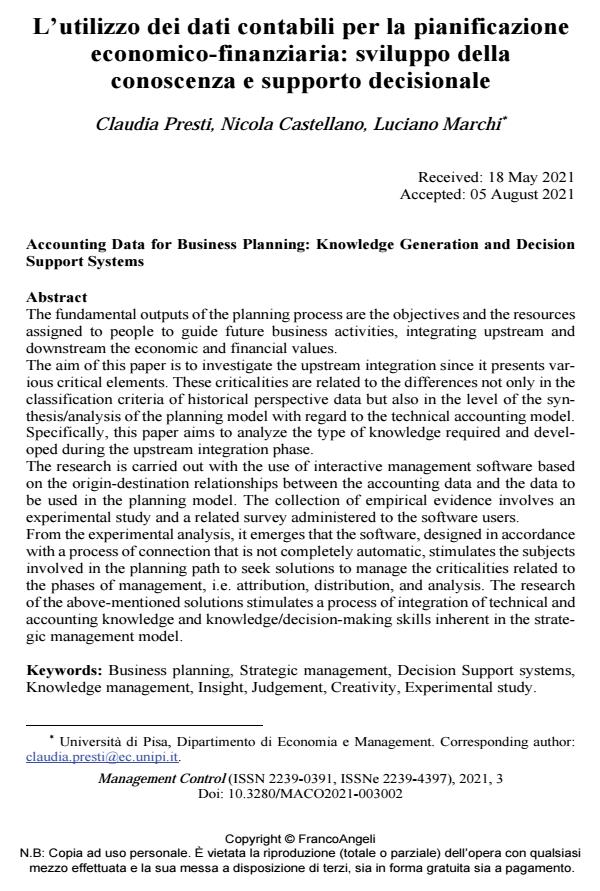Accounting Data for Business Planning: Knowledge Generation and Decision Support Systems
Journal title MANAGEMENT CONTROL
Author/s Claudia Presti, Nicola Castellano, Luciano Marchi
Publishing Year 2021 Issue 2021/3
Language Italian Pages 26 P. 16-40 File size 263 KB
DOI 10.3280/MACO2021-003002
DOI is like a bar code for intellectual property: to have more infomation
click here
Below, you can see the article first page
If you want to buy this article in PDF format, you can do it, following the instructions to buy download credits

FrancoAngeli is member of Publishers International Linking Association, Inc (PILA), a not-for-profit association which run the CrossRef service enabling links to and from online scholarly content.
The fundamental outputs of the planning process are the objectives and the re-sources assigned to people to guide future business activities, integrating upstream and downstream the economic and financial values. The aim of this paper is to investigate the upstream integration since it presents various critical elements. These criticalities are related to the differences not only in the classification criteria of historical perspective data but also in the level of the synthesis/analysis of the planning model with regard to the technical accounting model. Specifically, this paper aims to analyze the type of knowledge required and developed during the upstream integration phase. The research is carried out with the use of interactive management software based on the origin-destination relationships between the accounting data and the data to be used in the planning model. The collection of empirical evidence involves an experimental study and a related survey administered to the software users. From the experimental analysis, it emerges that the software, designed in accord-ance with a process of connection that is not completely automatic, stimulates the subjects involved in the planning path to seek solutions to manage the criticalities related to the phases of management, i.e. attribution, distribution, and analysis. The research of the above-mentioned solutions stimulates a process of integration of technical and accounting knowledge and knowledge/decision-making skills in-herent in the strategic management model.
Keywords: Business planning, Strategic management, Decision Support systems, Knowledge management, Insight, Judgement, Creativity, Experimental study
- Le dimensioni della conoscenza aziendale. Profili di investigazione tra crisi pandemica ed economia digitale Rosa Lombardi, in MANAGEMENT CONTROL 3/2021 pp.5
DOI: 10.3280/MACO2021-003001
Claudia Presti, Nicola Castellano, Luciano Marchi, L’utilizzo dei dati contabili per la pianificazione economico-finanziaria: sviluppo della conoscenza e supporto decisionale in "MANAGEMENT CONTROL" 3/2021, pp 16-40, DOI: 10.3280/MACO2021-003002